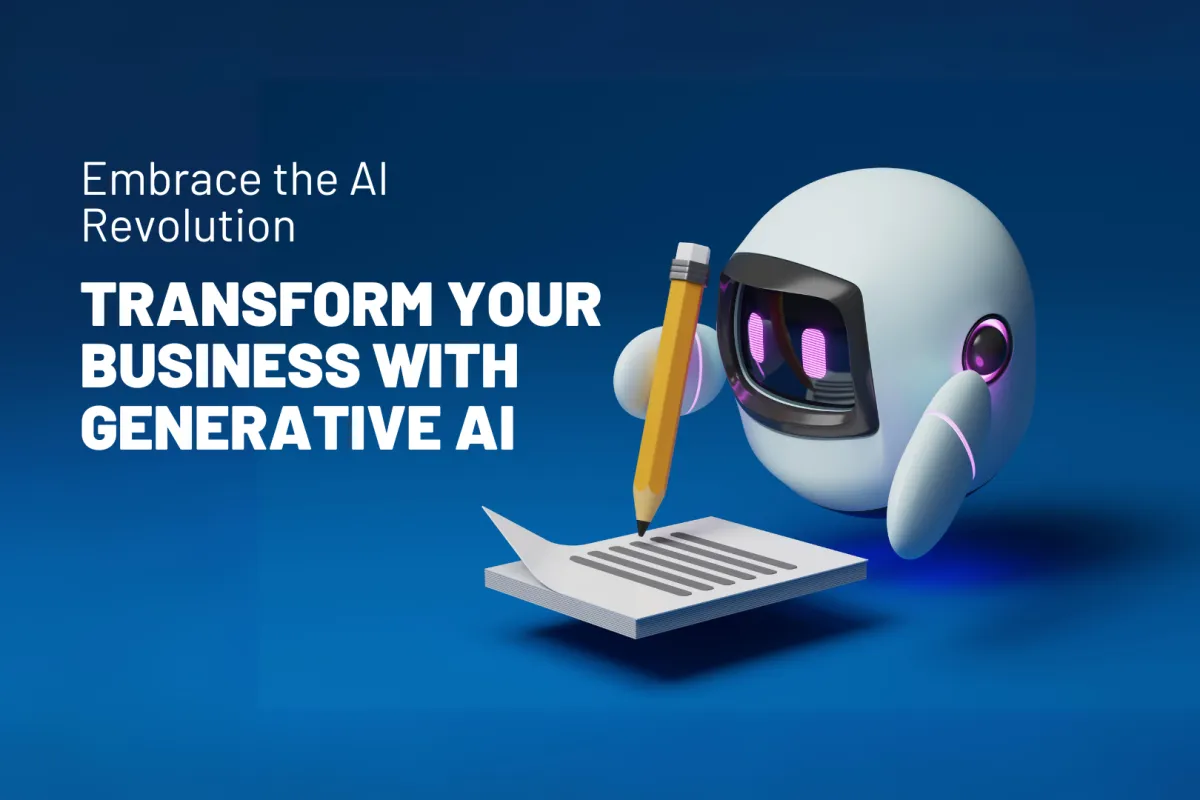Aaron's Blog
Blog Post Categories

🌐🚀 Embrace the AI Revolution: Transform Your Business with Generative AI 🤖💡
"The best way to predict the future is to invent it."
- Alan Kay
Introduction
In this era of rapid technological advancement, the rise of generative AI stands out as a pivotal development, reshaping the way businesses operate and innovate. Much like the awe-inspiring capabilities seen in sci-fi films, generative AI is turning what once seemed like fantasy into reality. It's not just an enhancement tool; it's a game-changer. This newsletter will dive deep into generative AI, exploring its potential to revolutionize business operations, customer engagement, and competitive strategies. As we unpack this topic, we'll draw parallels to iconic technological advancements in movies, illustrating the power and potential of AI in a business context. Get ready to explore how this transformative technology can be the key to unlocking new levels of efficiency, creativity, and growth in your business.
Background
The journey of generative AI from theoretical concepts to business-critical technology mirrors the evolution of the internet and mobile technology. Initially viewed with skepticism, these technologies quickly became indispensable tools for business success. Similarly, generative AI, which began as a novel method for creating content, has rapidly evolved into a powerful business tool. Its ability to analyze data, generate insights, and even create content is reminiscent of the revolutionary changes brought about by the introduction of computers and the internet. This section of the newsletter will delve into the historical evolution of generative AI, drawing parallels with past technological disruptions to illustrate its potential impact on businesses today.
Key Challenges
Embracing generative AI is akin to stepping into a new world of possibilities, yet it comes with its challenges. The primary hurdle is resistance to change, a common trait in traditional business cultures. This resistance can be likened to a scenario from "The Matrix," where the protagonist chooses between embracing a challenging reality or remaining in comfortable ignorance. Similarly, businesses today must choose between embracing the transformative potential of AI or clinging to outdated practices. Another challenge is the perceived complexity of AI technologies. Like the intricate gadgets in James Bond movies, AI can seem dauntingly complex to the uninitiated. This section will explore these challenges in detail, using real-life case studies and examples to illustrate the obstacles businesses face in adopting generative AI.
Solutions and Recommendations
To harness the full potential of generative AI, businesses need to adopt a proactive approach. This involves integrating AI into existing systems and fostering a culture that embraces innovation and continuous learning. Companies can start with small, focused AI projects, gradually expanding their scope as they gain confidence and expertise. Just like Tony Stark in "Iron Man," who continually innovates and improves his suit, businesses must continuously evolve their use of AI technologies. This section will provide practical solutions and recommendations for businesses at various stages of AI adoption, from beginners to those looking to scale their existing AI initiatives.
By the Numbers
The impact of AI on business efficiency, customer satisfaction, and overall performance is significant and growing. For instance, AI-driven companies have reported up to a 40% increase in efficiency. Additionally, businesses using AI for customer interactions have seen a 33% improvement in customer satisfaction scores. These figures highlight the tangible benefits of AI adoption in various business sectors. This section will present more detailed statistics and infographics to illustrate the impact of AI on business performance, drawing on recent studies and industry reports.
Future Outlook
Looking ahead, the role of AI in business is set to become even more significant. Advances in AI technologies will likely lead to more intuitive, versatile, and creative AI applications, dramatically transforming business operations and strategy. This evolution can be compared to the shift from traditional 2D movies to immersive 3D and virtual reality experiences, reflecting the profound impact of technological advancements on industries. This section will explore predictions and trends for the future of AI in business, discussing how AI might evolve and continue to transform the business landscape in the coming years.
Conclusion
In conclusion, integrating generative AI into business is essential in navigating the tech tsunami. Like the evolution of cinema from silent films to immersive 3D experiences, the evolution of AI represents a paradigm shift in business operations and customer engagement. For those seeking expert guidance on implementing these transformative technologies, Aaron Alfini Enterprises offers fractional CIO services tailored to your business needs. Embrace AI with us and transform your business into a tech-forward, innovative powerhouse.

🌐🚀 Embrace the AI Revolution: Transform Your Business with Generative AI 🤖💡
"The best way to predict the future is to invent it."
- Alan Kay
Introduction
In this era of rapid technological advancement, the rise of generative AI stands out as a pivotal development, reshaping the way businesses operate and innovate. Much like the awe-inspiring capabilities seen in sci-fi films, generative AI is turning what once seemed like fantasy into reality. It's not just an enhancement tool; it's a game-changer. This newsletter will dive deep into generative AI, exploring its potential to revolutionize business operations, customer engagement, and competitive strategies. As we unpack this topic, we'll draw parallels to iconic technological advancements in movies, illustrating the power and potential of AI in a business context. Get ready to explore how this transformative technology can be the key to unlocking new levels of efficiency, creativity, and growth in your business.
Background
The journey of generative AI from theoretical concepts to business-critical technology mirrors the evolution of the internet and mobile technology. Initially viewed with skepticism, these technologies quickly became indispensable tools for business success. Similarly, generative AI, which began as a novel method for creating content, has rapidly evolved into a powerful business tool. Its ability to analyze data, generate insights, and even create content is reminiscent of the revolutionary changes brought about by the introduction of computers and the internet. This section of the newsletter will delve into the historical evolution of generative AI, drawing parallels with past technological disruptions to illustrate its potential impact on businesses today.
Key Challenges
Embracing generative AI is akin to stepping into a new world of possibilities, yet it comes with its challenges. The primary hurdle is resistance to change, a common trait in traditional business cultures. This resistance can be likened to a scenario from "The Matrix," where the protagonist chooses between embracing a challenging reality or remaining in comfortable ignorance. Similarly, businesses today must choose between embracing the transformative potential of AI or clinging to outdated practices. Another challenge is the perceived complexity of AI technologies. Like the intricate gadgets in James Bond movies, AI can seem dauntingly complex to the uninitiated. This section will explore these challenges in detail, using real-life case studies and examples to illustrate the obstacles businesses face in adopting generative AI.
Solutions and Recommendations
To harness the full potential of generative AI, businesses need to adopt a proactive approach. This involves integrating AI into existing systems and fostering a culture that embraces innovation and continuous learning. Companies can start with small, focused AI projects, gradually expanding their scope as they gain confidence and expertise. Just like Tony Stark in "Iron Man," who continually innovates and improves his suit, businesses must continuously evolve their use of AI technologies. This section will provide practical solutions and recommendations for businesses at various stages of AI adoption, from beginners to those looking to scale their existing AI initiatives.
By the Numbers
The impact of AI on business efficiency, customer satisfaction, and overall performance is significant and growing. For instance, AI-driven companies have reported up to a 40% increase in efficiency. Additionally, businesses using AI for customer interactions have seen a 33% improvement in customer satisfaction scores. These figures highlight the tangible benefits of AI adoption in various business sectors. This section will present more detailed statistics and infographics to illustrate the impact of AI on business performance, drawing on recent studies and industry reports.
Future Outlook
Looking ahead, the role of AI in business is set to become even more significant. Advances in AI technologies will likely lead to more intuitive, versatile, and creative AI applications, dramatically transforming business operations and strategy. This evolution can be compared to the shift from traditional 2D movies to immersive 3D and virtual reality experiences, reflecting the profound impact of technological advancements on industries. This section will explore predictions and trends for the future of AI in business, discussing how AI might evolve and continue to transform the business landscape in the coming years.
Conclusion
In conclusion, integrating generative AI into business is essential in navigating the tech tsunami. Like the evolution of cinema from silent films to immersive 3D experiences, the evolution of AI represents a paradigm shift in business operations and customer engagement. For those seeking expert guidance on implementing these transformative technologies, Aaron Alfini Enterprises offers fractional CIO services tailored to your business needs. Embrace AI with us and transform your business into a tech-forward, innovative powerhouse.
Copyright 2026. All rights reserved
Testimonials

Lorem ipsum dolor sit amet, consectetur adipiscing elit, sed do eiusmod tempor incididunt ut labore et dolore magna aliqua. Ut enim ad minim veniam, quis nostrud exercitation ullamco laboris nisi ut aliquip ex ea commodo consequat.
JANE DOE

Lorem ipsum dolor sit amet, consectetur adipiscing elit, sed do eiusmod tempor incididunt ut labore et dolore magna aliqua. Ut enim ad minim veniam, quis nostrud exercitation ullamco laboris nisi ut aliquip ex ea commodo consequat.

